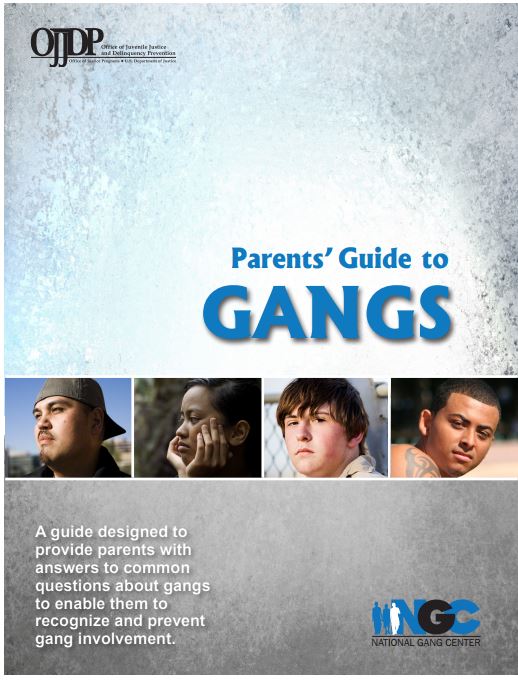Parents
Parents play an essential role in keeping young people out of gangs. There are many things parents can do to help their children stay away from gangs, including monitoring their activities, fostering close relationships with them, and using positive and consistent discipline. However, parents often lack factual information about gangs. This guide is designed to provide parents with answers to common questions about gangs to enable them to recognize and prevent gang involvement. Click the cover below to view the full guide.
What are the Signs?
VERY EARLY YEARS AGES 0-5
- Hypervigilance to threat
- Cognitive impairment, including verbal deficits
- Insecure attachment to a primary caregiver
- Early aggression and acting-out behavior
6 YEARS AND UP
- Antisocial behaviors
- Having been rejected and/or victimized by peers
- Poor parental monitoring
- Alcohol/drug use
- Negative life events
- Mental health problems
- School
- Poor school performance
- Disconnected from school
- Feeling unsafe at school
RISK FACTORS – SPECIFIC TO COMMUNITY
- Many area youth are involved in illegal behavior
- Availability and use of firearms
- Availability and use of drugs
- Low neighborhood attachment
What Can I Look For?

- Withdrawing from family activities and planned events
- Changed academic performance or declining school attendance
- Defiant or confrontational behavior, such as talking back, verbal abuse, name-calling, and disrespect for parental authority
- Staying out late without reason
- Unusual desire for secrecy
- Angry outbursts, excessive aggression
- Excessive worry about safety; constantly surveying surroundings for danger.
- Sudden negative attitudes about law enforcement or adults in positions of authority (school officials or teachers)
- Change in attitude about school, church, or other normal activities or change in behavior when attending these activities.
- Drastic changes in personal style.
- Withdrawal from longtime friends and forming bonds with an entirely new group of friends.
- Suspected use of drugs, such as alcohol, inhalants, and narcotics.
- Possession of firearms, ammunition, or other weapons.
- Non-accidental physical injuries (such as evidence of being beaten or injuries to hands and knuckles from fighting).
What Can I Do?
Talk to your child about the negative consequences of gang behaviors and ways to avoid them
Be clear that you disapprove of gangs and do not want to see your child hurt or arrested. Be firm in your expectations that your child should NOT:
• Associate with any gang-involved individuals.
• Hang out where gang members congregate.
• Attend any party or social event sponsored by gangs.
• Use any kind of hand or finger signs that may be meaningful to gangs, especially in pictures (even as a joke).
• Wear clothing that may have meaning to gangs in your area. (Explain to your child that these clothing items can put him or her in danger and that you will not purchase them or allow them to be worn.)
Get to know your child’s friends and the friends’ parents
Be aware of their attitudes toward drugs, alcohol, and gangs. When children start to feel pressure to use drugs or join gangs, it usually comes from their friends.
Familiarize yourself with the Internet, popular slang terms, and your child’s online activity
Communicate with your child about the potential negative consequences of online activity, including what he or she may post online. Spend time online with your child. Ask your child to show you his or her favorite online activities, sites, and online contacts. Finally, keep the computer in a common area and utilize the computer’s and Web sites’
Talk to your child about ways to deal with pressure from friends
Help your child practice simple ways to respond to peer pressure. For example, if your child is challenged by a peer who says, “If you were my friend, you would,” your child can respond, “If you were my friend, you wouldn’t ask.” Then, he or she should walk away.
Limit interaction with gang-involved individuals
One of the strongest risk factors for joining a gang is living in the same house as someone who is involved in gangs. If your child has older siblings or other relatives in your home who are associated with gangs, be very watchful of the influence they have on your child, and intervene immediately if your child starts to copy their dress, attitudes, and/or behaviors.
Set firm limits with your child
Children and teenagers need to clearly know what is expected of them and the consequences for acting otherwise. When your child
misbehaves, be sure to use fair and consistent discipline, while demonstrating unconditional love and support for your child.
Plan family time
Make time for your family to play, eat meals together, take trips (even to local parks or activities), keep family traditions, and have family meetings to talk about plans, feelings, and complaints.
Source
http://www.ncpc.org/resources/files/pdf/gangs/11788-NCPC-Gang-FactSheet.pdf
OJJDP—Parents Guide to Gangs Changing Course—Preventing Gang Membership
OJJDP—Juvenile Justice Bulletin (Gang Prevention: An Overview of Research and Programs)

